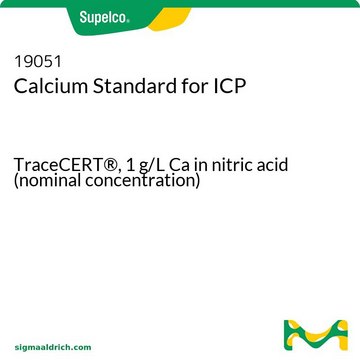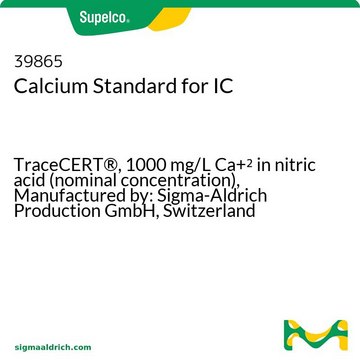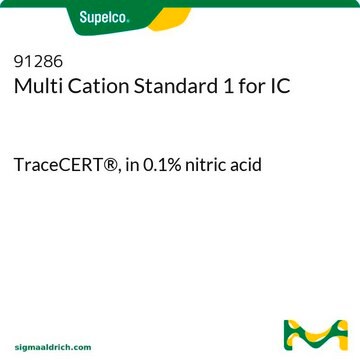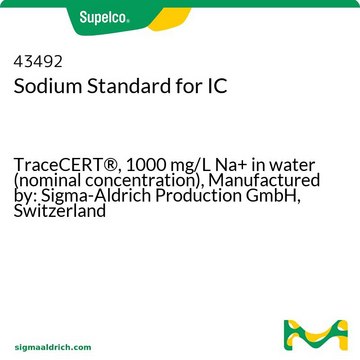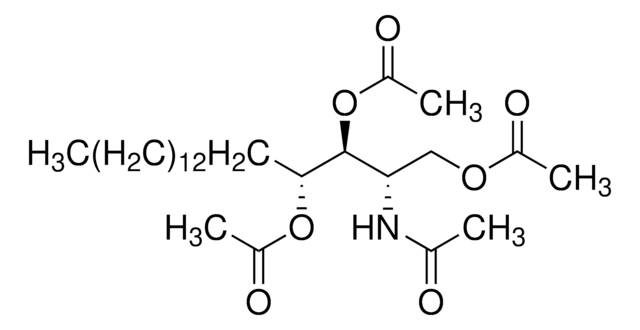おすすめの製品
詳細
This eluent concentrate for ion chromatography is determined by potentiometric titration. Content and expiry date can be found on the certificate.
アプリケーション
- Design of a new nanocomposite based on Keggin-type [ZnW(12)O(40)](6-) anionic cluster anchored on NiZn(2)O(4) ceramics: Explores the synthesis of advanced materials using Methanesulfonic acid, contributing to developments in energy storage and catalysis technology (Rezvani et al., 2024).
- Nanosuspensions in ophthalmology: Overcoming challenges and enhancing drug delivery for eye diseases: Discusses the role of Methanesulfonic acid in the formulation of nanosuspensions, enhancing therapeutic efficiency in ophthalmologic applications (Fathi-Karkan et al., 2024).
- Building Flame-Retardant Polymer Electrolytes via Microcapsule Technology for Stable Lithium Batteries: Methanesulfonic acid may be utilized in the synthesis of flame-retardant materials for safer lithium battery technologies, addressing critical needs in electronic manufacturing (Zhang et al., 2024).
- Catalysts for C-N coupling in urea electrosynthesis under ambient conditions from carbon dioxide and nitrogenous species: Highlights the application of Methanesulfonic acid in developing catalysts for green chemistry processes, particularly in the efficient synthesis of urea from environmentally benign sources (Yang et al., 2024).
関連事項
Visit the IC Portal to learn more
調製ノート
Prepared with methanesulfonic acid and high purity water (18.2 MΩ, 0.2 μm filtered)
関連製品
製品番号
詳細
価格
保管分類コード
12 - Non Combustible Liquids
WGK
nwg
引火点(°F)
Not applicable
引火点(℃)
Not applicable
個人用保護具 (PPE)
Eyeshields, Gloves
適用法令
試験研究用途を考慮した関連法令を主に挙げております。化学物質以外については、一部の情報のみ提供しています。 製品を安全かつ合法的に使用することは、使用者の義務です。最新情報により修正される場合があります。WEBの反映には時間を要することがあるため、適宜SDSをご参照ください。
毒物及び劇物取締法
劇物
労働安全衛生法名称等を通知すべき危険物及び有害物
名称等を通知すべき危険物及び有害物
Jan Code
55517-1L:
55517-VAR:
55517-BULK:
この製品を見ている人はこちらもチェック
Chris Twelves et al.
Breast cancer research and treatment, 148(3), 553-561 (2014-11-09)
Data from two phase 3 studies of eribulin were pooled in analyses initially requested by the European Medicines Agency to assess whether specific patient subgroups, previously treated with an anthracycline and a taxane, benefited from eribulin. Study 305/EMBRACE included women
Neal W Sach et al.
Organic letters, 14(15), 3886-3889 (2012-07-18)
A general synthesis of aryl ethers from primary and secondary alcohols and aryl mesylates is presented. The reaction proceeds via a sulfonyl-transfer mechanism. In this paper, we compare the sulfonyl transfer reaction to Mitsunobu ether formation. The reaction can be
Solvejg Jørgensen et al.
Physical chemistry chemical physics : PCCP, 15(14), 5140-5150 (2013-03-02)
The gas phase reaction between methane sulfonic acid (CH3SO3H; MSA) and the hydroxyl radical (HO), without and with a water molecule, was investigated with DFT-B3LYP and CCSD(T)-F12 methods. For the bare reaction we have found two reaction mechanisms, involving proton
Norio Murai et al.
Organic letters, 14(11), 2818-2821 (2012-05-18)
A one-pot primary aminomethylation of aryl halides, triflates, mesylates, and tosylates via Suzuki-Miyaura cross-coupling reactions with sodium phthalimidomethyltrifluoroborate followed by deamidation with ethylenediamine is reported.
Cassandra J Gaston et al.
Environmental science & technology, 44(5), 1566-1572 (2010-02-04)
Dimethyl sulfide (DMS), produced by oceanic phytoplankton, is oxidized to form methanesulfonic acid (MSA) and sulfate, which influence particle chemistry and hygroscopicity. Unlike sulfate, MSA has no known anthropogenic source making it a useful tracer for ocean-derived biogenic sulfur. Despite
ライフサイエンス、有機合成、材料科学、クロマトグラフィー、分析など、あらゆる分野の研究に経験のあるメンバーがおります。.
製品に関するお問い合わせはこちら(テクニカルサービス)

